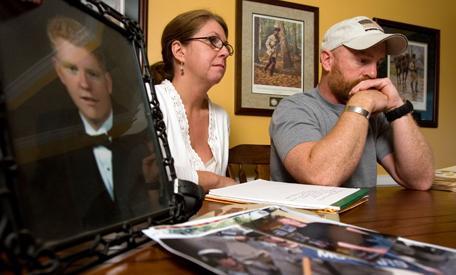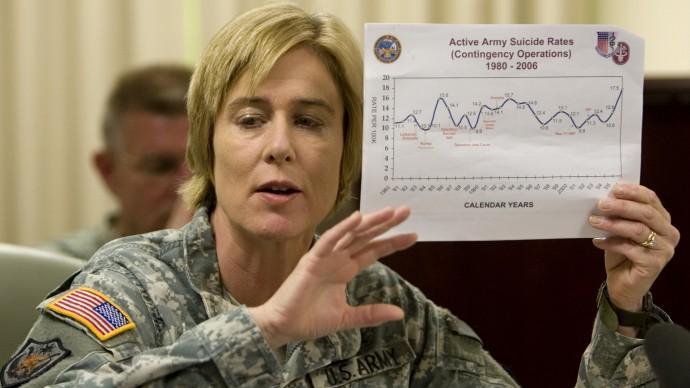University junior Mark Hall thinks about killing himself twice a day.
Not long ago, Hall was an active duty non-commissioned officer in the U.S. Marine Corps. He served two tours overseas, one in Iraq and one in Afghanistan, but in some ways he never fully came home.
“I battle with suicide daily. I don’t find life rewarding anymore. Before my service, I was happy,” Hall said. “I can’t put my finger on it — where the depression comes from. I don’t know why we were over there, I didn’t feel like I was fighting for the flag or for my family. I don’t know why my friends died.”
An old U.S. Army marching cadence rings, “Misery, misery, this Army life is killing me.”
It’s a cadence that, according to the Department of Defense, has proved sadly prophetic.
There were as many as 349 suicides among U.S. military personnel in 2012, the highest number recorded since the Department of Defense began keeping detailed records in 2001.
The lion’s share of those lost came from my alma mater, the U.S. Army, with 182 self-inflicted fatalities. The U.S. Marine Corps registered 48 suicides, the U.S. Air Force 59 and the U.S. Navy 60.
In recent years, the Department of Defense and U.S. Department of Veterans Affairs have drastically stepped up their suicide intervention programs. Despite these efforts, the number dead by their own hands continues to rise.
And though not all soldiers suffer from suicidal thoughts, depression has become ubiquitous to the military.
“I’ve never experienced suicidal thoughts, but a lot of my friends have,” said John April, an LSU sophomore, non-commissioned officer and combat veteran currently serving in the Louisiana National Guard.
More soldiers died via suicide rather than combat, which claimed 313 in 2012, according to ABC.
“When I first got to Afghanistan, a veteran told me the most important thing to do as a leader was to look after my squad when we got home,” April said, “He told me I stood to lose more of my guys to depression than to Taliban bullets. He was right.”
Roughly half a battalion — 349 suicides — killed not by hostile gunfire or improvised explosive devices, but by systemic ambivalence.
No, it’s not just institutional neglect, but a sort of grinding apathy perpetrated on a national level.
“I don’t think either war was right,” Hall said. “The people that call us ‘baby killers’ oppose the war for the wrong reasons, and the people who call us heroes support the war for the wrong reasons. They’re the most frustrating, and neither side gets it.”
Though some of the blame can be placed on military leadership and the government, some is our own.
We lined up in 2002 and 2003, cheering on our boys and girls as they were shipped off to Iraq and Afghanistan to quench our national thirst for revenge — and then we promptly pushed their trials and tribulations further from the front page.
We demoted our soldiers to the scrolling ticker at the bottom of the 24/7 cable news, overlaid like an afterthought on top of human interest pieces about Silicon Valley philanthropists and celebrity gossip.
“It’s hard to talk to people who don’t know, who don’t understand…It offends me how removed civilians are,” April said.
Now our soldiers have returned home to shoulder a double burden — the stress of trying to make a life with skills that don’t translate into an already pressurized job market and an experience 99 percent of their peers can’t empathize with or comprehend.
“It’s hard to come back from a place where you’re doing something important everyday,” April said, “It’s hard to go from detonating roadside bombs to being a cashier at Jiffy-Lube. Reintegration is the hardest part.”
Hall echoed April’s sentiment.
“I was never depressed when I was over there. It wasn’t until I came home I started wrestling with this darkness,” he said.
To some extent, all of us are to blame.
I spent a brief period of my life in the U.S. Army. I underwent Basic Combat Training at Fort Jackson, S.C., before being injured and discharged after completing only six months of my three-year enlistment.
I would never claim the title veteran, and I don’t understand the trauma that comes with seeing the infamous elephant — being shot at, blown up or constantly fearing for my life.
What I know is this: the people I came to know and respect during my short stint in uniform represented the brightest and most courageous among us and they shouldn’t have to live in fear.
“It’s gotten worse since I’ve come home. But I still have hope. I still want a family; I still want a fulfilling career,” Hall said. “I’m not going to give up.”
Men like Hall and April were, and remain, the best of who we are and what we believe in distilled into a few thousand human beings — America, concentrate.
The fact that this has happened — that this has been allowed to happen — should serve as a stark warning to us as a civilization.
Our veterans cannot become old news; they cannot be forgotten.
Editor’s Note: All names are pseudonymous. “Mark Hall” didn’t want his family knowing he was suicidal, and “John April” is actively serving and not allowed to officially make comments to the media.









